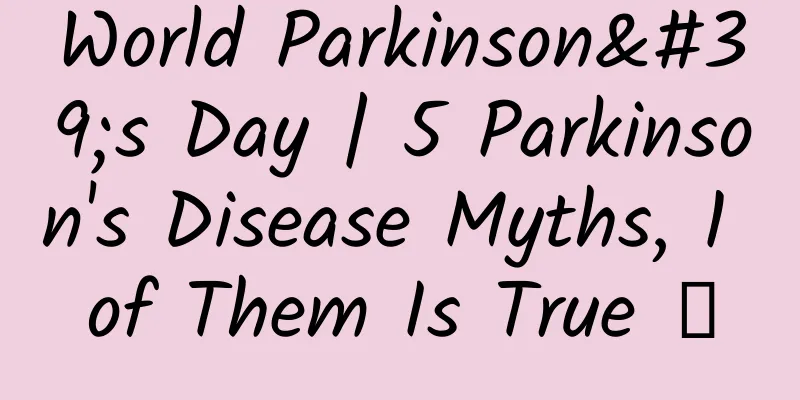World Parkinson's Day | 5 Parkinson's Disease Myths, 1 of Them Is True →

|
Parkinson's disease is a neurodegenerative disease, and it is not unfamiliar to many people. As we all know, the most common group for Parkinson's disease is the elderly. However, in recent years, there have been many rumors that "some young people under the age of 20 will also suffer from 'juvenile Parkinson's syndrome'". In addition, "Parkinson's disease is a genetic disease", "Parkinson's disease is incurable", "hand tremor is Parkinson's disease" and other statements are also widely circulated... Many rumors make it difficult to distinguish true from false, and many people are "scared" when they hear the word Parkinson's disease. April 11 is World Parkinson's Day. Today we will analyze the rumors related to Parkinson's disease one by one, and learn about it scientifically so that everyone will no longer be afraid of "Parkinson's disease". Copyright images in the gallery. Reprinting and using them may lead to copyright disputes. What are Parkinson's symptoms? Parkinson's disease (PD) is a neurodegenerative disease. There are more than 3 million Parkinson's patients in China, ranking first in the world. Its prevalence is second only to Alzheimer's disease (AD). The initial symptoms of Parkinson's disease are often tremors that start from one hand and slowly spread to the lower limbs and other parts of the body, manifesting as slow movement, muscle stiffness, difficulty maintaining balance, and are often accompanied by depression, anxiety, sleep disorders, and decreased cognitive function. The hallmark symptoms of Parkinson's disease can be summarized as: shaking, slowness, stiffness, and falling . The "shake" is a tremor that usually starts as a slight tremor in the hand, especially when standing still. Many patients describe the feeling as "holding a pill" or "rubbing a pill between fingers." "Slow" means slow movement. The patient's daily movements become slower, his expression may become dull, his steps become smaller, and he has difficulty starting. "Stiffness" refers to muscle stiffness, which reduces the range of free movement; "Falling" refers to problems with balance and coordination, and patients may experience unsteadiness and difficulty walking, which increases the risk of falling. In addition, some patients may experience non-motor symptoms , such as: 1. Decreased or lost sense of smell; 2. The tone is flat and has no ups and downs; 3. Numbness and pain in limbs (joints); 4. Excessive daytime sleepiness or nighttime dreaming accompanied by loud shouting and body movements (rapid eye movement sleep disorder or restless legs syndrome); 5. Constipation, excessive sweating, and urination disorders; 6. Anxiety, depression, decreased cognitive level, etc. Rumor 1 Hand tremors are Parkinson's The truth: In many people's impressions, hand tremors are Parkinson's disease, but this is not actually the case. "Hand tremor" is medically called " tremor ". Parkinson's disease is also known as "tremor paralysis", which is a common cause of hand tremor. The main manifestations of Parkinson's disease hand tremor are: shaking when resting, aggravated when nervous or excited, relieved during activities, and disappeared after sleep. However, it should be noted that some patients may not experience hand tremor. However, Parkinson's disease is not the only disease that can cause tremor. It also needs to be distinguished from other diseases clinically: 1. Physiological tremor, which occurs in certain situations such as anxiety, tension, fear, and hypoglycemia. The symptoms disappear when the triggering factors are removed. The most common factor is increased sympathetic nerve excitability. 2. Essential tremor, also known as primary tremor, is characterized by postural or action tremor of the distal upper limbs, which may be accompanied by tremor of the lower limbs, head, mouth, face or voice. Tremor is its only manifestation; 3. Metabolic tremor, the most common cause of which is hyperthyroidism, causes high-frequency fine postural tremor of the upper limbs; 4. Drug-induced tremor. Drugs that induce tremor include beta-receptor agonists, theophylline, antidepressants, lithium, thyroxine, and amiodarone, and some are related to lifestyle, such as caffeine and alcohol. 5. Cerebellar tremor, which is characterized by no tremor at rest or at the beginning of limb movement, but strong tremor when the movement approaches the target. For example, when the patient is preparing to eat, the closer the hand is to the food, the more severe the tremor. For patients suffering from hand tremors, it is recommended to go to the hospital in time to identify the possible causes, take timely and reasonable treatment and conduct early intervention. Copyright images in the gallery. Reprinting and using them may lead to copyright disputes. Rumor 2 Parkinson's is a genetic disease The truth: This statement is still debatable. The vast majority of Parkinson's disease cases are not directly inherited. In fact, people still do not fully understand the pathological mechanism of Parkinson's disease. Existing studies have shown that Parkinson's disease is related to lesions in the compact part of the ventral substantia nigra of the midbrain. The substantia nigra in the midbrain contains a large number of dopaminergic neurons. The dopamine secreted by these neurons is one of the important neurotransmitters in the central nervous system. It has two main functions: (1) to make the body "move" and allow people to walk, talk, and other activities; (2) to participate in the reward system to generate motivation and pleasure. However, in the brains of Parkinson's patients, dopamine neurons located in the substantia nigra are dying, leading to a lack of dopamine in the body, which in turn affects the normal functioning of the body. What causes the massive death of neurons? Current research suggests that genes, age, drugs, environmental toxicity, trauma, and viral infection may all be involved in the deformation and death of dopaminergic neurons in Parkinson's disease. So, is Parkinson's disease hereditary? Although researchers have discovered several familial disease-causing genes (such as SNCA, PARK2, PARK7, PINK1, etc.), in fact, the vast majority of Parkinson's disease cases are not directly inherited . In large-scale population studies, researchers have found that people whose first-degree relatives suffer from Parkinson's disease (such as their parents or siblings) have only a 5% to 10% higher risk of developing the disease than the general population. Rumor 3 Young people can also get Parkinson's The truth : It’s true! Although Parkinson's disease is more common in people over 65 years old, about 5% to 10% of patients are diagnosed with early-onset Parkinson's disease before the age of 40. Early-onset Parkinson's disease patients are further divided into young-onset Parkinsons disease (YOPD) with an onset age of 21 to 40 years old and juvenile Parkinson's disease (JP) with an onset age of less than 21 years old. Canada's CTV reports that a two-year-old may be the youngest patient ever diagnosed with "juvenile Parkinson's disease with dystonia." Rumor 4 Parkinson's disease is incurable The truth : Parkinson's disease is a thorny issue for the medical community, and there is no cure for it. However, Parkinson's disease is not a rapidly fatal disease, and its overall impact on life expectancy is not very significant. In addition, there are many drugs and treatments that can delay or improve the disease. The standard treatment for Parkinson's disease is dopamine replacement therapy, which is to replenish the brain with dopamine in time due to the death of dopaminergic neurons. The main clinical drugs are: levodopa (L-Dopa), COMT inhibitors, MAO-B inhibitors, dopamine agonists, glutamate antagonists (NMDA antagonists), etc. Although drugs are effective for early Parkinson's symptoms, as the disease progresses, the efficacy of the drugs will decrease, and surgical treatment may be required. Among surgical treatments, the most effective method is deep brain stimulation (DBS), which is also known as an intracerebral pacemaker. The working principle is to implant stimulation electrodes in the nuclei or specific brain areas of the brain, and use electrical pulses for deep brain stimulation to promote the secretion of dopamine by nerve cells, thereby improving symptoms. Myth 5 You can stop taking the medicine when your symptoms improve The truth : Some patients may think that Parkinson's symptoms can be treated without medication, or that as long as the medication controls the symptoms, they can stop, reduce or change medication at any time. This understanding is wrong. With current medical methods, if a patient is diagnosed with Parkinson's disease, they usually need to take medication for life to relieve symptoms. Sudden discontinuation of anti-Parkinson's drugs may cause withdrawal malignant syndrome, which not only risks worsening symptoms, but is also more likely to be life-threatening. Patients taking medication should not stop taking the medication on their own. If they need to reduce or change the dosage, they should also reduce the dosage slowly under the guidance of a doctor. Although lifelong medication is frustrating, researchers are also exploring new treatment options, the most promising of which is cell transplantation , also known as cell replacement therapy, which replaces dead dopaminergic neurons in the midbrain with new cells. If this approach works, in the future, Parkinson's patients may be able to cure Parkinson's once and for all with just a few cell therapies. If you suspect you or your family members have Parkinson's disease How to test yourself? If you suspect that you or your family members have Parkinson's disease, how can you self-check? You may try to answer the following 9 questions first: 1. Do you have difficulty getting up from a chair? 2. When you write, do your handwriting become smaller and smaller? 3. Is your speaking voice getting softer than before? 4. Do you fall easily when walking? 5. Do your feet sometimes suddenly feel like they are glued to the ground and you can’t lift them up? 6.Are your facial expressions not as rich as before? 7. Do your arms or legs often tremble? 8. Do you have difficulty buttoning your clothes? 9. Do your lower limbs feel tight and stiff when you walk? Do you take small steps when you walk? If you answer "yes" to 2 or more of the above questions, it is recommended that you go to the hospital for evaluation to determine whether you have early-stage Parkinson's disease. How to prevent Parkinson's disease? Middle-aged and elderly people, people who have long-term exposure to pesticides and heavy metals, and people with a family history of Parkinson's disease are at high risk of Parkinson's disease. To prevent Parkinson's disease, you can try these methods: 1. Enhance physical exercise and mental activities to delay brain aging; 2. Avoid staying up late, maintain a regular work and rest schedule, and keep a good mood; 3. Pay attention to your living environment and avoid or reduce contact with substances that are toxic to the nervous system, such as carbon monoxide, pesticides, insecticides, or heavy metals such as manganese and mercury. Take precautions when in contact; 4. Pay attention to dietary hygiene and health, eat more vegetables and fruits, and reduce the intake of processed meat; 5. Pay attention to medication and avoid or reduce the use of drugs that may induce Parkinson's symptoms; 6. Drink green tea and coffee in moderation. In summary, Parkinson's disease is a chronic progressive degenerative disease. Early diagnosis and early treatment can slow down the progression of the disease. References [1]https://parkinsonseurope.org/2016/07/28/two-year-old-could-be-worlds-youngest-person-diagnosed-with-parkinsons/#:~:text=A%20two%2Dyear%2Dold%20toddler,he%20tries%20to%20stand%20still.%E2%80%9D [2]https://ncrcgdxy.csu.edu.cn/info/1042/2571.htm#:~:text=%E2%80%9C%E6%89%8B%E6%8A%96%E2%80%9D%E5%9C%A8%E5%8C% BB%E5%AD%A6%E4%B8%8A,%E6%97%B6%E5%87%8F%E8%BD%BB%EF%BC%8C%E7%9D%A1%E7%9C%A0%E5%90%8E%E6%B6%88%E5%A4%B1%E3%80%82 [3]https://www.nia.nih.gov/health/parkinsons-disease/parkinsons-disease-causes-symptoms-and-treatments#:~:text=Parkinson's%20disease%20is%20a%20brain,have%20difficulty%20walking%20and%20talking. [4] Chinese Medical Association, Chinese Medical Association Journal, Chinese Medical Association General Practice Branch, et al. Guidelines for diagnosis and treatment of essential tremor in primary care (2021) [J]. Chinese Journal of General Practitioners, 2021, 20(10): 1030-1036. DOI: 10.3760/cma.j.cn114798-20210624-00489. [5]Klein C, Westenberger A. Genetics of Parkinson's disease. Cold Spring Harb Perspect Med. 2012 Jan;2(1):a008888. doi: 10.1101/cshperspect.a008888. PMID: 22315721; PMCID: PMC3253033. [6]https://www.hopkinsmedicine.org/health/conditions-and-diseases/parkinsons-disease/the-genetic-link-to-parkinsons-disease#:~:text=How%20direct%20is%20the%20link,SNCA%20gene%20(see%20below). [7] Parkinson's Disease and Movement Disorders Group, Chinese Society of Neurology, Chen Shengdi. Chinese Guidelines for the Treatment of Parkinson's Disease (3rd Edition)[J]. Chinese Journal of Neurology, 2014, 47(06): 428-433. [8]Park, TY., Jeon, J., Lee, N. et al. Co-transplantation of autologous Treg cells in a cell therapy for Parkinson's disease. Nature 619, 606–615 (2023). [9]https://www.sz.gov.cn/ztfw/ylws/wyw_183957/ywzsk_184570/content/post_10537184.html Author: Hardy, PhD in Neurobiology, Zhejiang University Reviewer: Li Jingjing Professor and Chief Physician, Department of Neurology, Beijing Tiantan Hospital |
<<: World Parkinson's Day | How much do you know about Parkinson's disease?
>>: Drug treatment for Parkinson's disease
Recommend
On which festival do people drink osmanthus wine? Is osmanthus wine delicious?
Osmanthus wine is light yellow in color, with a p...
What does a positive BV result mean?
Some women went to the hospital to check their se...
What kind of underwear is good for small breasts?
Small breasts are a kind of trouble for women. Th...
Will a man really become "feminine" after getting a vasectomy?
Netizen question: My wife and I already have a ba...
What is brown-red discharge?
It is a normal physiological phenomenon for women...
What is the reason for lower back pain when you are pregnant?
Pregnancy is an experience that is difficult for ...
How to prevent potential "brain stealers"? Do not eat raw food to avoid parasitic infection
Recently, according to foreign media reports, doc...
What is the best way to eat crabapples? Can ornamental crabapples be eaten?
In recent issues of Encyclopedia Knowledge Networ...
What are the scientific and effective contraceptive methods after abortion?
Artificial abortion is an effective means of prev...
What causes vulvar itching?
As all female friends know, the female vulva is a...
What causes vaginal labia itching?
Sex can make the life of a couple more harmonious...
How many days does it take for the ovulation test paper to turn from a weak positive to a strong positive?
Ovulation test strips are mainly used to detect f...
How many hours can you sit during confinement?
After giving birth to a baby, pregnant women need...
How to take care of yourself after hysterectomy?
When it comes to the harm of uterine fibroids, I ...
What is a sandstorm? What are the hazards of sandstorms?
When a sandstorm occurs, floating dust is everywh...









